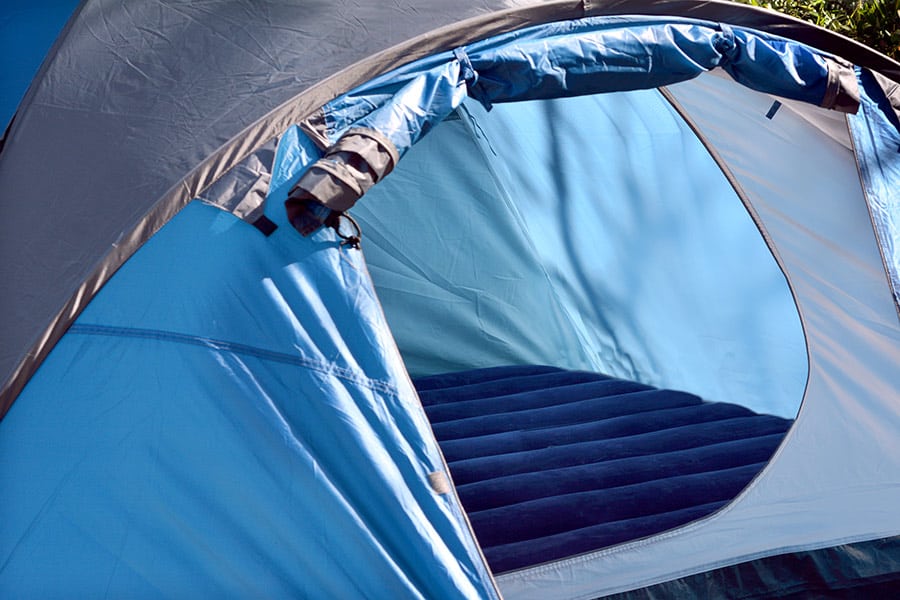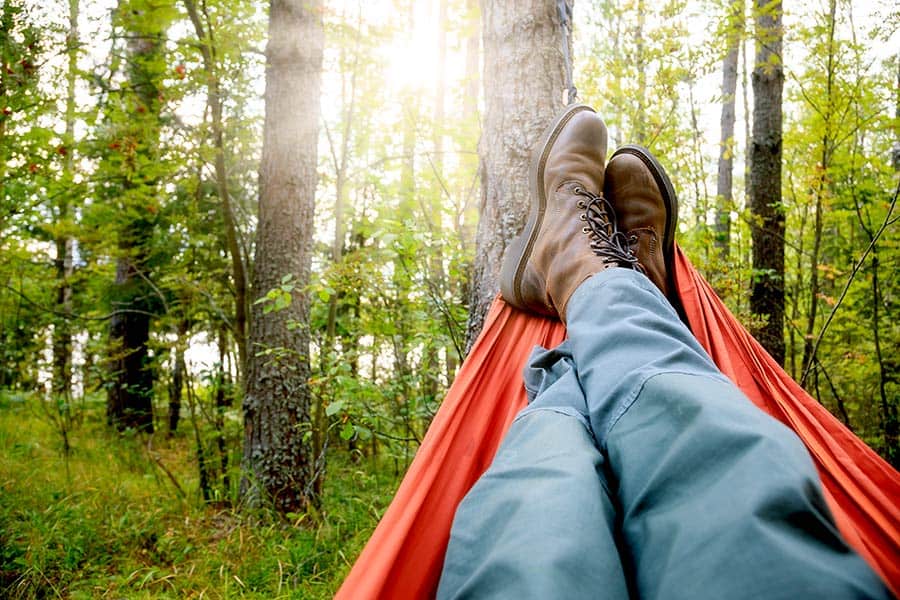
Whether you’re a camping pro or about to set out on your first adventure, having a relaxing, peaceful sleep away from your bed can prove to be a challenge. It’s essential to consider your sleeping options before heading out to the great unknown and choose which will give you the best shot at a good night’s sleep.
Do you need an air mattress for camping? No, you do not need an air mattress for camping, but it might be a good idea if you want a restful night’s sleep. There are also several alternatives to an air mattress, including sleeping cots, sleeping bags, or even hammocks, depending on your needs.
Keep reading to find out what advantages and disadvantages there are to air mattresses, things to consider when deciding on your sleeping options, and what alternatives you have available instead of air mattresses.
Getting some much-needed rest on a camping trip is super important, so you have the energy to do all the activities you love, such as hiking, swimming, or kayaking. Use the following options as a guide to help you choose the best, most comfy sleeping option for you.
Air Mattresses While Camping: Here’s the Deal
An air mattress can be great for camping and is even considered a luxury camping item by some. Here are some great reasons to pack an air mattress:
- You are lifted fully from the ground, so you do not feel the rough terrain beneath you while sleeping
- They are simple to pack if you plan on camping near your car
- You will wake up feeling refreshed and lacking all the aches and pains of sleeping on the ground or directly on the truck or van floor.
There is, however, a downside to air mattresses that has campers considering alternatives. Cons to an air mattress include:
- Prone to leaks and punctures that may cause you to wake up in the middle of the night to a deflated mattress
- Cumbersome and require extra accessories; not for backpacking
- Requires a pump to inflate once at your camping location.
- Some mattresses may be pricey
If you think an air mattress is the best option for you, here are a few factors to consider before purchasing one. Select an air mattress that is going to give you firm support, be stable, so you don’t get awake every time your partner turns and works well with fitted sheets. A plush top will also provide more comfort and will help to keep your sheets from sliding all around.
Some mattresses are better for camping due to their quick inflation and deflation time, puncture-resistant technology, and how easy it is to transport. Choose a mattress that has a higher height; this will make it easier to get into and out of.
Purchase a mattress that has a good warranty, so if the mattress should have any defects or you encounter any problems, the warranty should cover it. Also, when ordering, you might have to purchase a pump separately, because some mattresses don’t include the pump.
Air mattresses will sometimes lose firmness overnight because of the temperature getting colder. It doesn’t necessarily mean that you have a leak in your mattress. Just keep it pumped up as needed, but don’t over-inflate it.
Sometimes, when going camping, it seems like one of the things that end up being a problem is getting your air mattress inflated. To learn the ins and outs of inflating an air mattress, read our post here.
A Few Things to Consider When Camping
While weighing out your sleeping options, consider the following:
Location
Do some research on the location you’ll be in or around to know the terrain better, if the area is low and prone to flooding, and if there is a lot of wildlife. These are a few of the conditions that could affect the way you set up your camp.
Weather
Become familiar with the climate of where you plan to camp and check the forecast for the specific location. How hot or cold the nights are will help you decide what sleeping gear will be the most beneficial for a comfortable night’s sleep.
Type of Camping
Whether you plan on camping near your car or hiking to your preferred location will impact your decision regarding how you sleep.
For example, if you plan to hike several miles to your camping spot, it’s less likely you’ll want to carry around bulky sleeping gear with extra accessories, while this wouldn’t be a big deal if you’re planning on camping near your car where items can easily be stored.
Where You Plan on Sleeping
If you plan to sleep in your car, truck, van, or SUV, you may be limited on space, whereas if you plan on tent camping, you’ll have the ability to stretch out a bit and won’t have limitations due to space.
Other Posts of Interest
- Maximizing Space In A Camper Van – 8 Tips You Need To Know
- Can My Car Support a Rooftop Tent?
- How To Insulate A Van Floor: A Step-by-Step Guide
What Are Alternatives to an Air Mattress While Camping?

Here are our favorite alternatives if an air mattress is a little too bulky for you to bring along.
Sleeping Cots
Sleeping cots are a great, sturdy alternative to air mattresses. Sleeping cots have a frame, making them a more comfortable option as they mimic a bed more closely. Cots are available in several different sizes so that campers can move around more comfortably. There is no chance a cot will become punctured or spring a leak, and cots are known for being long-lasting.
Depending on the cot you choose, they can become bulky and heavy, not making them ideal if you plan on backpacking or hiking. Sleeping cots are also not suitable if you plan on sleeping in your car or minivan.
Sleeping Bags
If you enjoy being close to nature, a sleeping bag may be the best option for your camping trip. Sleeping bags are lightweight and easy to pack, making them ideal for those who are hiking or backpacking while camping. There is no risk of a sleeping bag deflating, and if comfort or warmth is your main worry, there are tons of thickness options on the market.
Sleeping bags do require sleeping on the sometimes cold ground putting campers close to critters and sharp rocks. If you plan on sleeping in the open, you’ll also run the risk of no protection from the elements. Or, you need to bring a camping pad along to give you some extra cushion.
When choosing sleeping bags to take camping, you might be wondering how many sleeping bags you will need. Read our post here on that very topic.
Futon Mattress
When it comes to comfort, a mattress is pretty hard to beat. If you have a futon mattress lying around, consider taking it with you on your camping adventure. A futon mattress is ideal for tent or car camping; it requires practically no setup time and is guaranteed to keep you cozy all night long.
If you plan on hiking or backpacking, a futon mattress is more than likely out of the question as it is bulky and heavy.
Hammocks
For the adventurous ones, consider sleeping in a hammock. Hammocks are packable and lightweight, making them ideal for backpacking. There are a lot of options when it comes to hammocks, including water-resistant and fully enclosed, and hammocks keep you entirely off the ground.
While there are many benefits of being suspended under the stars, there is a downside. Hammocks require trees and aren’t ideal if you’re camping in a cooler climate. Hammocks can also be hard to get used to, move around in, and get in and out of.
Final Thoughts on Air Mattresses
Getting a good night’s rest is important anytime, but especially on a camping trip when you’re probably partaking in a lot of physical activity, and are away from the comfort of your bed.
Before you decide what will provide the best night’s sleep for you, consider your location, the weather, what type of camping you’ll be doing, and where you plan on sleeping.
While you don’t need an air mattress for camping, it’s certainly an option, but so is a cot, a sleeping bag, an old futon mattress, or even a hammock. Consider how you sleep best and choose to adjust your camping trip and camping supplies accordingly.





